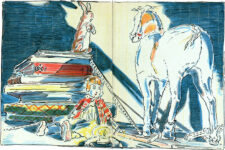
And you run, and you run to catch up with the sun but it’s sinking
Racing around to come up behind you again
The sun is the same in a relative way but you’re older
Shorter of breath and one day closer to deathEvery year is getting shorter, never seem to find the time
Plans that either come to naught or half a page of scribbled lines
Hanging on in quiet desperation is the English way
The time is gone, the song is over, thought I’d something more to say
The lyrics are from the song “Time” by Pink Floyd, which is part of their 1973 album “The Dark Side of the Moon.” This album is a monumental piece in the history of rock music, known for its conceptual depth, sonic experimentation, and introspective lyrics. “Time” in particular stands out for its existential themes, focusing on the passage of time, the inevitability of aging, and the human condition’s existential dilemmas.
“And you run, and you run to catch up with the sun but it’s sinking / Racing around to come up behind you again”
employs the imagery of the sun’s cycle to symbolize the human race against time.
This vividly portrays the futile effort to outpace the day, only to find that time continuously cycles, with each day ending before we know it, emphasizing the relentless and cyclical nature of time.
“The sun is the same in a relative way but you’re older / Shorter of breath and one day closer to death”
reflects on the constancy of the sun (and by extension, time itself) in contrast to human life, which is transient and marked by aging.
This line confronts the listener with the sobering reality of mortality, highlighting the inevitability of aging and death as constants in the face of life’s fleeting nature.
“Every year is getting shorter, never seem to find the time / Plans that either come to naught or half a page of scribbled lines”
talks about the perception of time speeding up as one ages and the frustration of unfulfilled plans and aspirations.
It suggests a common human experience of time slipping away, with ambitions and intentions often left unrealized.
“Hanging on in quiet desperation is the English way / The time is gone, the song is over, thought I’d something more to say”
captures a particular stoicism attributed to British culture, where struggles and fears are borne silently.
The closing remark echoes the song’s overarching theme – that life is short and we must make the most of the limited time we have.









